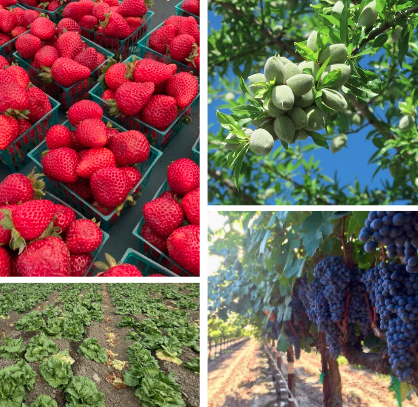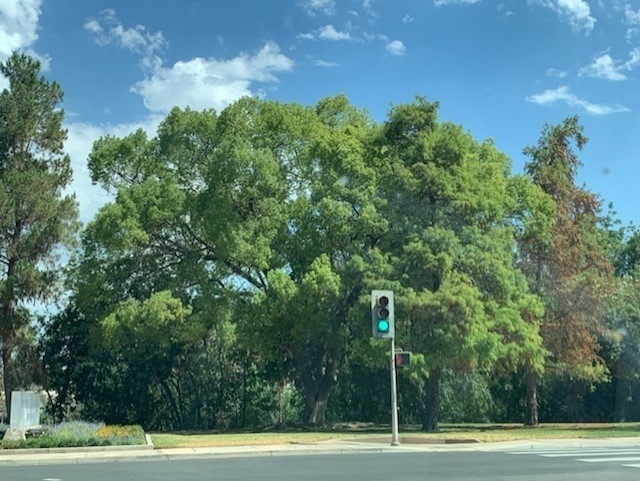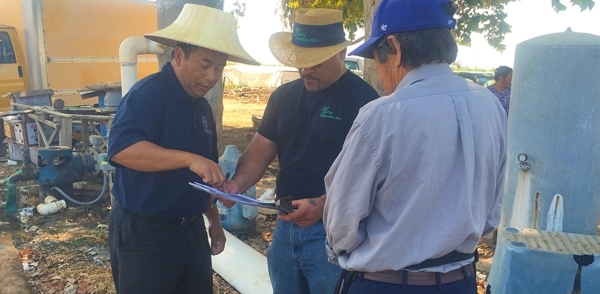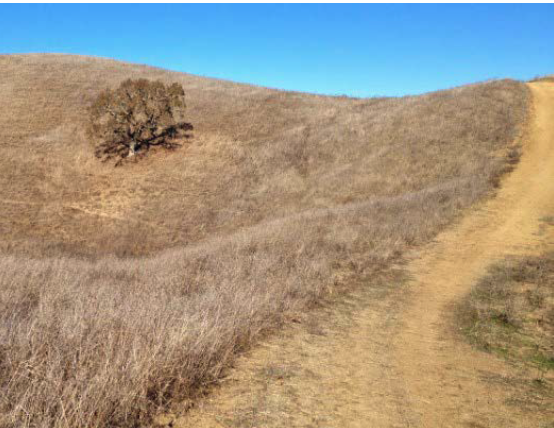Posts Tagged: adaptation
Lawn-pocalypse! Surviving Drought
Ah, summer! The season of sunburns, pool parties, and… lawn droughts. If your once lush, green carpet now looks like a crunchy brown doormat, you're not alone. Let's dive into why your yard is staging a dramatic death scene and what you can do to...

Bermuda grass and weeds overtaking drought stressed turf grass.
Climate-smart crop production workshops March 5-7 in Ventura, Salinas and Tulare
Growers invited to learn how to manage risks to fruit, nut, vegetable production
UC Cooperative Extension is offering workshops in Ventura, Salinas and Tulare to help growers adapt their fruit, nut and vegetable production practices to variable climate conditions.
"Growers, farm and ranch managers, and technical assistance providers can learn about the latest research and advances in managing risks to agricultural production that can result from climate change and climate variability,” said Daniele Zaccaria, associate professor in agricultural water management for Cooperative Extension at UC Davis.
Tapan Pathak, UCCE specialist at UC Merced, will speak about climate change trends, potential impacts on agricultural production and decision support tools. Zaccaria and local experts will discuss cover cropping, pests and other issues.
During a roundtable session, participants will discuss their own production challenges resulting from climate change and variability.
“Participants will also learn about tools available to aid manage climate change and climate variability risks," Zaccaria said.
The Climate-Smart Agricultural Production Practices workshops will be held in three locations:
Ventura: Vegetable and Berry Production
March 5 (8 a.m.–1:30 p.m.)
669 County Square Dr., Suite 100
Speakers include UCCE advisors Andre Biscaro, Ben Faber and Mark Battany, and other scientists and experts from Ventura County Resource Conservation District and Land IQ. Register at https://bit.ly/VenturaCrops.
Salinas: Vegetable, Berry and Grapevine Production
March 6 (8 a.m. –2 p.m.)
1432 Abbott St.
Speakers include Daniel Hasegawa and Eric Brennan of USDA-ARS and UCCE advisors Larry Bettiga, Michael Cahn and Mark Bolda. Register at https://bit.ly/SalinasCrops.
Tulare: Fruit and Nut Production
March 7 (8 a.m.–2 p.m.)
4500 South Laspina St.
Speakers include UCCE advisors Jhalendra Rijal, Mark Battany, Mohammad Yaghmour, Sandipa Gautam, Brent Holtz and other scientists and experts from USDA-NRCS, Almond Board of California; California Pistachio Research Board and Land IQ. Register at https://bit.ly/TulareCrops.
Workshops are free and include coffee breaks, lunch, workshop materials along with the presentations. Registration is required.
These workshops are supported by grants from the California Department of Food and Agriculture and USDA's National Institute of Food and Agriculture.
Residents’ water security concerns could spur climate adaptations
Study: Climate impacts widespread across California, fueling worries over water supply
As water system managers across California devise strategies to help secure their water supply, they often face a major obstacle to implementing those measures: a lack of interest or will to act among community members.
“One of the things that the literature has found is that even if water system managers and local decisionmakers are really worried about climate change and water security, a lot of the adaptation strategies that they have in their toolbox actually require support from residents,” said Kristin Dobbin, a UC Cooperative Extension specialist focused on water justice planning and policy.
Because popular support is essential for realizing many water-related adaptations – from changing the rate structure to approving bonds for new infrastructure – Dobbin and her colleagues recently published a paper looking deeper at residents' experiences of, and concern about, climate impacts to household water supply.
Through a drinking water-focused portion of a long-term panel survey administered by California State University, Sacramento, scholars in the Household Water Insecurity Experiences research network had the opportunity to query Californians on how they are experiencing the climate crisis at their taps. Specifically, the researchers sought to analyze respondents' perceptions of future climate risks to water security.
“As a group that studies drinking water access in California, we're often looking at the system level and community level,” said Dobbin, based at the UC Berkeley Department of Environmental Science, Policy and Management. “So it was exciting to dive into the household level and understand what's happening at a more individual level.”
Climate impacts seen ‘up and down the state'
The statewide survey, conducted in spring 2021, elicited 704 responses from the panelists, representing every census region in the state and nearly every county. More than one-third (34%) of respondents said that their water supply had been affected by an extreme weather event in the past five years. Given the timing of the survey, drought was unsurprisingly the most frequently mentioned impact. Importantly, these climate impacts were felt across California.
“There is an inclination to assume that drought and other impacts are a geographically bounded issue, but what we really see is that is not the case,” Dobbin said. “These impacts are happening up and down the state, all the way to the Oregon border.”
Overall, 85% of respondents reported that they were concerned about the long-term reliability of their water supply. Crucially, the study also indicated that residents were making the connection between climate impacts and risks to their future water security.
“The more impacts they reported, the more concerned they were about future supply and reliability,” said study co-author Amanda Fencl, a senior climate scientist with the Union of Concerned Scientists.
Droughts and heat waves, in particular, seem to increase residents' concerns over water supply the most. Dobbin suggests that framing the need for water-security adaptation strategies around those specific weather events could be particularly useful in marshaling community support.
Knowing the level of concern within the community – and understanding the best way to convey the urgency of climate adaptation measures – could be a boon for local managers seeking to gain public backing for more expensive water projects. Such projects might include self-sufficiency measures that reduce reliance on imported water from other parts of the state.
“That could bolster some water managers to have more confidence in using climate change and extreme events as a way to motivate ratepayers to get on board with these bigger investment decisions,” Fencl said.
Study highlights avenues for more research
While flooding barely registered as a climate impact in the 2021 survey results, Dobbin said that the responses would likely be very different today, after atmospheric rivers inundated the state this past winter. Floodwaters can damage water treatment plants – and storms can knock out power to private wells and larger water system treatment and distribution facilities.
In fact, from the 2021 survey, power outages due to utilities' wildfire prevention policies were the climate impact most frequently mentioned in the “other” category, highlighting for researchers the need to consider and plan for the interconnectedness of water and power systems.
“People forget about the interplay between a reliable electric grid and the ability to run water in your house and the ability for water systems to pump and treat water,” Fencl explained. “When we think about disaster response and disaster preparedness, we need to be a bit more holistic.”
The researchers also pointed to significant differences in experiences of climate impacts across gender and racial demographics, with Latino, Asian American Pacific Islander and LGBTQ+ respondents reporting higher rates of impacts. Given the relatively small sample sizes, however, Fencl said there needs to be larger – and more inclusive – surveys to get a clearer picture of those disproportionate impacts.
Even still, Dobbin added that their study serves as a reminder for scholars, water managers and policymakers to re-center community members, in all their diversity, as key players in the push for more effective and sustainable climate adaptation strategies.
“One of the takeaways from the paper is that we can't forget about the role of the public in this conversation – and we can't bypass the public,” Dobbin said. “The bottom line is that most of the adaptations that we have available to us require some level of residential involvement.”
In addition to Dobbin and Fencl, authors of the study, published in the journal Climatic Change, include Gregory Pierce, UCLA Luskin Center for Innovation; Melissa Beresford, San Jose State University; Silvia Gonzalez, UCLA Latino Policy and Politics Institute; and Wendy Jepson, Texas A&M University.
Climate-Change Resources
University of California UC ANR Green Blog (Climate Change and Other Topics) https://ucanr.edu/blogs/Green/index.cfm?tagname=climate%20change (full index)
Examples:
- Save Trees First: Tips to Keep Them Alive Under Drought https://ucanr.edu/b/~CdD
- Landscaping with Fire Exposure in Mind: https://ucanr.edu/b/~G4D
- Cities in California Inland Areas Must Make Street Tree Changes to adapt to Future Climate https://ucanr.edu/b/~oF7
Drought, Climate Change and California Water Management Ted Grantham, UC Cooperative Extension specialist (23 minutes) https://youtu.be/dlimj75Wn9Q
Climate Variability and Change: Trends and Impacts on CA Agriculture Tapan Pathak, UC Cooperative Extension specialist (24 minutes) https://youtu.be/bIHI0yqqQJc
California Institute for Water Resources (links to blogs, talks, podcasts, water experts, etc.) https://ciwr.ucanr.edu/California_Drought_Expertise/
UC ANR Wildfire Resources (publications, videos, etc.) https://ucanr.edu/News/For_the_media/Press_kits/Wildfire/ (main website)
-UC ANR Fire Resources and Information https://ucanr.edu/sites/fire/ (main website)
-Preparing Home Landscaping https://ucanr.edu/sites/fire/Prepare/Landscaping/
UC ANR Free Publications https://anrcatalog.ucanr.edu/ (main website)
- Benefits of Plants to Humans and Urban Ecosystems: https://anrcatalog.ucanr.edu/pdf/8726.pdf
-Keeping Plants Alive Under Drought and Water Restrictions (English version) https://anrcatalog.ucanr.edu/pdf/8553.pdf
(Spanish version) https://anrcatalog.ucanr.edu/pdf/8628.pdf
- Use of Graywater in Urban Landscapes https://anrcatalog.ucanr.edu/pdf/8536.pdf
- Sustainable Landscaping in California https://anrcatalog.ucanr.edu/pdf/8504.pdf
Other (Non-UC) Climate Change Resources
Urban Forests and Climate Change. Urban forests play an important role in climate change mitigation and adaptation. Active stewardship of a community's forestry assets can strengthen local resilience to climate change while creating more sustainable and desirable places to live. https://www.fs.usda.gov/ccrc/topics/urban-forests
Examining the Viability of Planting Trees to Mitigate Climate Change (plausible at the forest level) https://climate.nasa.gov/news/2927/examining-the-viability-of-planting-trees-to-help-mitigate-climate-change/
Reports and other information resources coordinated under the auspices of the United Nations and produced through the collaboration of thousands of international scientists to provide a clear and up to date view of the current state of scientific knowledge relevant to climate change. United Nations Climate Action
Scientific reports, programs, action movements and events related to climate change. National Center for Atmospheric Research (National Science Foundation)
Find useful reports, program information and other documents resulting from federally funded research and development into the behavior of the atmosphere and related physical, biological and social systems. Search and find climate data from prehistory through to an hour ago in the world's largest climate data archive. (Formerly the "Climatic Data Center") National Centers for Environmental Information (NOAA)
Think tank providing information, analysis, policy and solution development for addressing climate change and energy issues (formerly known as the: "Pew Center on Global Climate Change"). Center for Climate & Energy Solutions (C2ES)
Mapping Resilience: A Blueprint for Thriving in the Face of Climate Disaster. The Climate Adaptation Knowledge Exchange (CAKE) was launched in July 2010 and is managed by EcoAdapt, a non-profit with a singular mission: to create a robust future in the face of climate change by bringing together diverse players to reshape planning and management in response to rapid climate change. https://www.cakex.org/documents/mapping-resilience-blueprint-thriving-face-climate-disaster
Cal-Adapt provides a way to explore peer-reviewed data that portrays how climate change might affect California at the state and local level. We make this data available through downloads, visualizations, and the Cal-Adapt API for your research, outreach, and adaptation planning needs. Cal-Adapt is a collaboration between state agency funding programs, university and private sector researchers https://cal-adapt.org/
Find reports, maps, data and other resources produced through a confederation of the research arms of 13 Federal departments and agencies that carry out research and develop and maintain capabilities that support the Nation's response to global change. Global Change (U.S. Global Change Research Program)
The Pacific Institute is a global water think tank that combines science-based thought leadership with active outreach to influence local, national, and international efforts to develop sustainable water policies. https://pacinst.org/our-approach/
Making equity real in climate adaptation and community resilience policies and programs: a guidebook. https://greenlining.org/publications/2019/making-equity-real-in-climate-adaption-and-community-resilience-policies-and-programs-a-guidebook/
Quarterly CA Climate Updates and CA Drought Monitor Maps (updated each Thursday) https://www.drought.gov/documents/quarterly-climate-impacts-and-outlook-western-region-june-2022
Drought focus of Water Resources IMPACT magazine special issue
UC ANR experts address emotional toll of drought
Preparing the American West for prolonged drought is the focus of a double issue of Water Resources IMPACT magazine. The California Water Commission staff are guest editors for this special open-access edition of the magazine, which is published by the American Water Resources Association.
Faith Kearns, academic coordinator of University of California Agriculture and Natural Resources' California Institute for Water Resources, is among the authors delving into how drought impacts people and the environment and how we can better prepare for the inevitable.
The first issue, published on Feb. 14, focuses on water scarcity issues confronting California and the ways these issues affect different sectors.
In “Trauma, Care, and Solidarity: Addressing the Emotional Toll of Chronic Drought,” Kearns highlights the effects of drought on mental health. She points to the spike in suicide hotline calls when wells ran dry in Southeast Asian communities in California's Central Valley.
By listening to Southeast Asian farmers, Ruth Dahlquist-Willard and Michael Yang of UC Cooperative Extension were able to “lighten the load” for them by providing pragmatic support, Kearns writes.
“The scale of some of these highly emotional issues – drought, wildfires, climate change – can make them seem incredibly difficult, if not impossible, to deal with,” Kearns said. “At the same time, they are affecting everyone living in the western U.S. on a daily basis. I wanted to highlight and provide models based on work that people – whether they are researchers, clinical psychologists, or Cooperative Extension advisors – are doing right now to ease the way.”
The authors who contributed to the double issue are a diverse array of Tribal experts, academics, nongovernmental organization thought-leaders, water managers and water policy influencers, each of whom brings their own perspective on the topic of drought. Their expertise and perspectives in climate science, water policy and water management will help inform drought-related decision-making and support policies that better prepare the state to thrive during periods of prolonged water scarcity.
In addition to Kearns, the first issue includes articles contributed by:
- Samantha Stevenson, University of California, Santa Barbara
- Jay Lund, University of California, Davis
- Ron Goode, North Fork Mono Tribe
- Andy Fecko, Placer County Water Agency
- Jeff Mount, Public Policy Institute of California, and Ted Grantham, University of California, Berkeley/UC Cooperative Extension
- Nat Seavy and Karyn Stockdale, National Audubon Society
- Kjia Rivers, Community Water Center
- Cannon Michael, Bowles Farming
- Michelle Reimers, Turlock Irrigation District
The January/February edition of Water Resources IMPACT magazine can be accessed, free of charge, on the American Water Resources Association website at https://www.awra.org under “Publications.”
The second issue, to be published in March, will focus on drought response, considering the options for adaptation. This two-part series complements the Commission's work on strategies to protect communities and fish and wildlife in the event of a long-term drought.





